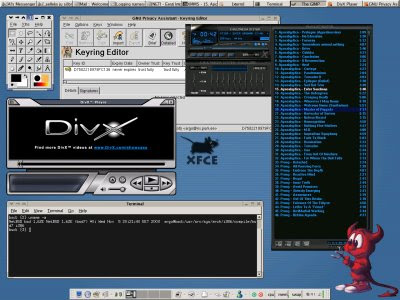 NetBSD is a free, fast, secure, and highly portable Unix-like Open Source operating system. It is available for a wide range of platforms, from large-scale servers and powerful desktop systems to handheld and embedded devices.
NetBSD is a free, fast, secure, and highly portable Unix-like Open Source operating system. It is available for a wide range of platforms, from large-scale servers and powerful desktop systems to handheld and embedded devices.Its clean design and advanced features make it excellent for use in both production and research environments, and the source code is freely available under a business-friendly license.
NetBSD is developed and supported by a large and vivid international community. Many applications are readily available through pkgsrc, the NetBSD Packages Collection.
Recent releases:
• 2010-11-19: BSD Release: NetBSD 5.1
• 2010-04-29: Development Release: NetBSD 5.1 RC1
• 2010-02-12: BSD Release: NetBSD 5.0.2
• 2009-08-02: BSD Release: NetBSD 5.0.1
• 2009-04-29: BSD Release: NetBSD 5.0
• 2009-04-17: Development Release: NetBSD 5.0 RC4
NetBSD 5.0 features greatly improved performance and scalability on modern multiprocessor (SMP) and multi-core systems. Multi-threaded applications can now efficiently make use of more than one CPU or core, and system performance is much better under I/O and network load.
In addition to scalability and performance improvements, a significant number of major features have been added. Some highlights are: a preview of metadata journaling for FFS file systems (known as WAPBL), the jemalloc memory allocator, X.Org instead of XFree86 on a number of ports, the Power Management Framework, ACPI suspend/resume support on many laptops, write support for UDF file systems, the Automated Testing Framework, the Runnable Userspace Meta Program framework, Xen 3.3 support for both i386 and amd64, POSIX message queues and asynchronous I/O, and many new hardware device drivers. » Full 5.0 Release Notes
A list of download sites providing FTP, AnonCVS, and other services may be found at NetBSD mirror sites page. We encourage users who wish to install via ISO images to download via BitTorrent by using the torrent files supplied in the ISO image area.
The NetBSD source code repository was established on March 21, 1993 and the first official release, NetBSD 0.8, was made in April, 1993. This was derived from 386BSD 0.1 plus the version 0.2.2 unofficial patchkit, with several programs from the Net/2 release missing from 386BSD re-integrated, and various other improvements. The first multi-platform release, NetBSD 1.0, was made in October 1994. Also in 1994, for disputed reasons, one of the founders, Theo de Raadt, left the project. He later founded a new project, OpenBSD, from a forked version of NetBSD 1.0 near the end of 1995. In 1998, NetBSD 1.3 introduced the pkgsrc packages collection.
Until 2004, NetBSD 1.x releases were made at roughly annual intervals, with minor "patch" releases in between. From release 2.0 onwards, each major NetBSD release corresponds to an incremented major version number, i.e. the major releases following 2.0 are 3.0, 4.0 and so on. The previous minor releases are now divided into two categories: x.y "stable" maintenance releases and x.y.z releases containing only security and critical fixes.
Updates: (via Distrowatch)Soren Jacobsen has announced the release of NetBSD 5.1: "The NetBSD Project is pleased to announce that version 5.1 of the NetBSD operating system is now available. NetBSD 5.1 is the first feature update of the NetBSD 5.0 release branch. It represents a selected subset of fixes deemed critical for security or stability reasons, as well as new features and enhancements. Please note that all fixes in security/critical updates are cumulative, so the latest update contains all such fixes since the corresponding minor release. Some highlights include: RAIDframe parity maps, which greatly improve parity rewrite times after unclean shutdown; X.Org updates; support for many more network devices; Xen PAE dom0 support; Xen PCI pass-through support."
See the release announcement and release notes for a complete list of changes. Installation CD images for 42 processor architectures are available for download from the project's FTP/HTTP mirrors and also via BitTorrent; quick links to the i386 and amd64 CD images (SHA512): i386cd-5.1.iso (238MB, torrent), amd64cd-5.1.iso (240MB, torrent).
| Major releases | Release date | Notable features and changes |
|---|---|---|
| 5.0 | April 29, 2009 | Rewritten threading subsystem based on a 1:1 model and rewritten scheduler implementation. Support for kernel preemption, POSIX real-time scheduling extensions, processor-sets, and dynamic CPU setsthread affinity. Added jemalloc memory allocator. A metadata journaling for FFS, known as WAPBL (Write Ahead Physical Block Logging). Rewritten kernel modules framework, which will replace old LKMs. for |
| 4.0 | December 19, 2007 | Added support for slab allocator, iSCSI target, CARP, tmpfs, Xen 3, the Kernel Authorization framework, Veriexec and other security extensions, and a Bluetooth protocol suite. |
| 3.0 | December 23, 2005 | Support for Xen 2.0 was added. Support for filesystems > 2 terabytesPluggable Authentication Modules added. OpenBSD Packet Filter was integrated as an alternative to IPFilter. UFS directory hash added. support. |
| 2.0 | December 9, 2004 | Addition of native POSIX threads and SMP support on i386 and other platforms. AMD64 architecture added. Support for UFS2 and SMBFS, addition of kqueue. |
| 1.6 | September 14, 2002 | Unified Buffer Cache (UBC) was introduced, which unifies the filesystem and virtual memory caches of file data. Zero-copy support for TCP and UDP transmit path. Ten new platforms supported. New implementation of cross-building (build.sh) infrastructure. Added support for multibyte LC_CTYPE locales. |
| 1.5 | December 6, 2000 | IPv6 and IPsec were added to the network stack. OpenSSL and OpenSSH imported. New implementation of rc.d system start-up mechanism. Start of migration to ELF-format binaries. A ktruss utility for kernel tracing was added. Six new platforms supported, including SPARC64. Added FFS soft updates and support for NTFS. |
| 1.4 | May 12, 1999 | UVM, a rewritten virtual memory subsystem, was introduced. Added RAIDframe, a software RAID implementation, and imported IPFilter. Completion of the integration of all remaining 4.4BSD Lite-2 kernel improvements. Ports to Power Macintosh and NeXTcube/stationUSB support. systems added. Added full |
| 1.3 | March 9, 1998 | XFree86 source tree was made a supported part of the distribution. Support for ISA Plug and Play, PCMCIA, ATAPI and APM added. ext2fs and FAT32 filesystems added. The pkgsrc packages collection system was introduced. |
| 1.2 | October 4, 1996 | Support for NFSv3, SCSI scanner and medium changer devices added. NTP phase-locked loop added in kernel. Ports for ARM and Sharp X68k systems added. |
| 1.1 | November 26, 1995 | Ports for DEC Alpha, Atari TT/Falcon030 and MVME68k systems added. Binary emulation facility added. Generic audio subsystem introduced. |
| 1.0 | October 26, 1994 | The first multi-platform release, supporting the PC, HP 9000 Series 300, Amiga, 68k Macintosh, Sun-4c series and the PC532. Also in this release, the legally encumbered Net/2-derived source code was replaced with equivalent code from 4.4BSD-lite, in accordance with the USL v BSDi lawsuit settlement. Addition of shared libraries and Kerberos 5. |
| 0.9 | August 20, 1993 | Contained many enhancements and bug fixes. This was still a PC-platform-only release, although by this time work was underway to add support for other architectures. Support for loadable kernel modules (LKM). |
| 0.8 | April 20, 1993 | The first official release, derived from 386BSD 0.1 plus the version 0.2.2 unofficial patchkit, with several programs from the Net/2 release missing from 386BSD re-integrated, and various other improvements.[ |
| Colour | Meaning |
|---|---|
| Green | Current release |
| Yellow | Old release; still supported |
| Red | Old release; not supported |













0 commenti:
Post a Comment